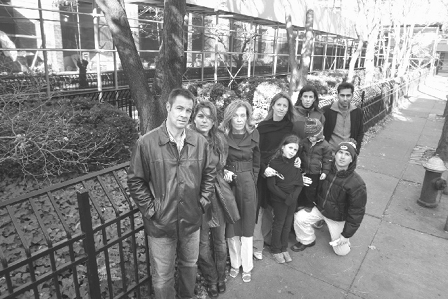By Albert Amateau
Residents of a Mercer St. co-op said at Manhattan Borough President Scott Stringer’s town hall meeting in the Village last week that they were adamantly opposed to New York University’s plan to expand its underground co-generation plant.
The residents of 250 Mercer St., one of them with a baby in his arms, said the planned expansion of the power plant located beneath a city-owned strip on the west side of Mercer St. could disrupt the tree-lined block for two years and destroy a row of about 20 trees, a few believed to be at least 40 years old.
But the disruption to Mercer St. could be avoided if N.Y.U. decides to expand the existing co-generation plant under Gould Plaza to the west.
Jerry Martin, a resident of the 275-apartment co-op between Third and Fourth Sts., told the Nov. 28 meeting that a university official acknowledged that the alternate western expansion would be feasible but would eliminate two basement classrooms in Warren Weaver Hall.
John Beckman, N.Y.U.’s spokesperson, said later that the university had not yet decided whether to expand the power plant to the east to the Mercer St. strip or to the west. The decision would be made “soon,” said Beckman but he could not be more specific. The project is expected to begin early next year with completion in 18 months.
N.Y.U. has already secured a vault permit from the city to expand the plant on the Mercer St. side, but whether the permit will be used was still uncertain this week.
“If it’s on the Mercer St. side, we’ll create a much improved plaza with the most mature trees possible,” Beckman said. Expanding the plant either way would reduce the university’s dependence on Manhattan’s Con Edison electric power grid, indirectly benefiting the entire community, Beckman said.
N.Y.U. officials Alicia Hurley and Allison Leary had told the 250 Mercer St. residents about the alternate options plan at a Nov. 15 shareholders meeting.
But residents said at the borough president’s Nov. 28 town hall forum that they didn’t want to see any trees destroyed.
“We live on Mercer St. because it’s a tree-lined street,” said one resident. “Isn’t this [Mercer St.] city property? Let’s save those trees,” he added. Stringer told the meeting that his office had learned of the project earlier last week and was planning to consult with N.Y.U. on the matter. City Councilmember Alan Gerson’s office was also consulting with residents and the university about the project. And a task force on the Washington Square area quality of life will discuss the project at 6:30 p.m. Dec. 12 at 19 Washington Pl.
Stringer, City Council Speaker Christine Quinn and State Senator Tom Duane responded to several other issues at the Nov. 28 town hall
Elise Marenson, who lives on Charles and Washington Sts., said that prostitutes and their clients are overrunning the West Village beginning as early as 7 p.m.
“They fornicate in the vestibules of our buildings,” Marenson said, urging that police arrest johns in order to control the problem. Quinn agreed the situation was dire. She recalled that her father while driving through the neighborhood one evening stopped at a traffic signal and was approached by a hooker.
Detective Mike Singer, Sixth Precinct community affairs officer, observed that prostitutes are released soon after arrest and are back on the street after a day or two.
Dave Poster, president of the Christopher St. Patrol, a local anticrime group, accused Stringer of ignoring a request for a meeting about the patrol’s demands regarding the crowds of gay youth who congregate on Pier 45, the Christopher St. Pier, and disrupt the West Village during the early morning hours from Thursday through Monday.
Stringer, however, replied that Poster had declined to compromise on the patrol’s demands, including an 11 p.m. instead of a 1 a.m. closing time for Pier 45 and an alternative exit from the pier rather than onto Christopher St.
Both Stringer and Quinn said the new city-sponsored Christopher St. initiative involving extra police and social services provided by The Door, would be evaluated next September after a year’s operation to determine its effectiveness.
Jonathan Greenberg, of the Open Washington Square Park Coalition and a plaintiff in the lawsuit seeking a new review of the park’s redesign currently pending in the Appellate Division, called on the borough president to go on record regarding the redesign.
“I believe the redesign process was flawed and there should be a new review process,” said Stringer.
Sharon Woolums, a frequent critic of the Washington Square Park redesign, called on Robert Redmond, the Department of Parks official who attended the town hall, to confirm whether the redesign called for the removal of 32 trees from the park. But Redmond declined to comment because the redesign is under litigation.




































